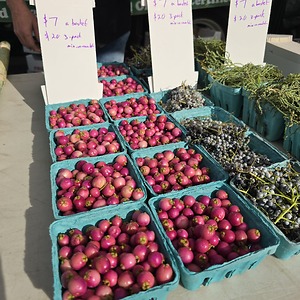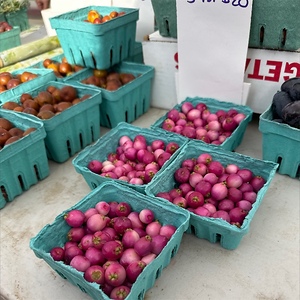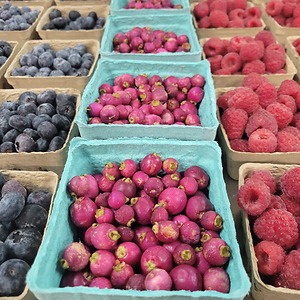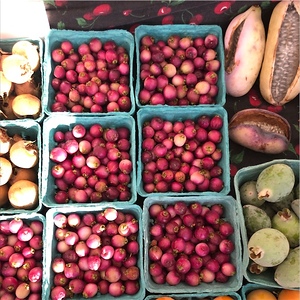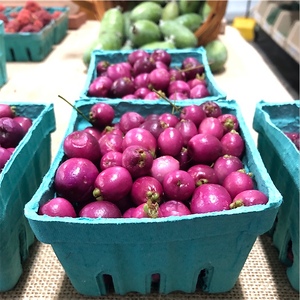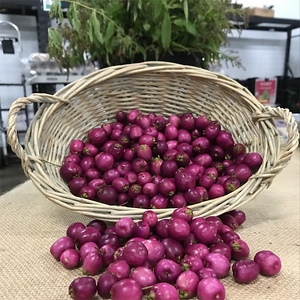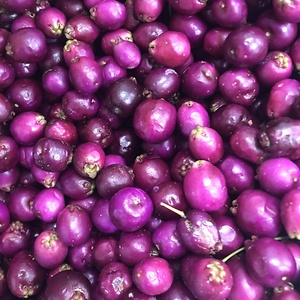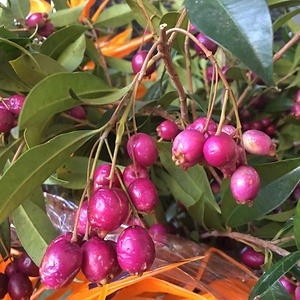


Lilly Pilly Berries
Estimated Inventory, bskt : 0
This item was last sold on : 09/22/24
Description/Taste
Lilly Pilly berries are small fruits, averaging 1 to 2 centimeters in length, and have a round to oval shape with a broad middle tapering to curved ends. Some berries may have a shallow depression at the top, while others have remnants of the blossom at the non-stem end. The tiny berries grow in large clusters, and the skin is thin, firm, shiny, and taut, ranging in color from white, pink-red, violet, to magenta, depending on the variety. Underneath the surface, the thin, white flesh is distinctly crisp with an aqueous, airy, cotton-like consistency. Some consumers compare the berry's crispness to the succulent nature of eating a nashi pear. Depending on the variety, the flesh may also be seedless or contain a pea-size hard seed. Lilly Pilly berries emit a clove-like aroma and are mildly acidic with a sweet-tart, musky, and metallic flavor. Many varieties will also have fruity, spice-filled notes reminiscent of cinnamon, pears, cranberries, and apples. It is important to note that each type of Lilly Pilly will vary in flavor and texture, and growing conditions and climate may alter the berry's taste.
Seasons/Availability
Lilly Pilly berries are available in the summer through fall in the Northern Hemisphere and the fall through winter in the Southern Hemisphere. In some tropical regions in the Southern Hemisphere, the plants may produce multiple harvests of berries throughout the year.
Current Facts
Lilly Pilly berries, botanically a part of the Syzygium genus, are brightly colored, sweet-tart fruits found on evergreen shrubs or trees belonging to the Myrtaceae family. There are over 1,200 different species loosely identified as Lilly Pilly within the Myrtaceae family, and approximately 75 of those species are found in the plant's native region of Australia. Each Lilly Pilly species bears fruit that varies in color, size, and flavor. Syzygium luehmannii, also known as Riberry, is considered one of the most common cultivated species, as the berries are slightly larger, contain smaller seeds, and have a sweeter flavor. Syzygium austral or Creek Lilly Pilly is also favored for its sweet fruits that can be consumed raw. Historically, Lilly Pilly berries were a source of food for indigenous people groups, and over time, the plants have become domesticated and desired for home garden landscapes. A single Lilly Pilly tree can produce over 176 pounds of fruit in one season, and outside of gardens, the trees are frequently found along city sidewalks, in parks, and planted as a natural fence, protective screen, or privacy hedge. Lilly Pilly berries are also known as Lilli Pilli, Monkey Apples, Australian Bush Cherry, Scrub cherry, and Cherry Satinash and are favored as a tropical ornamental plant with edible fruits for fresh eating and cooked preparations.
Nutritional Value
Lilly Pilly fruits are a source of vitamin C to strengthen the immune system while reducing inflammation, fiber to regulate the digestive tract, and folate to develop genetic material, including RNA and DNA. The berries also provide calcium to build strong bones and teeth, potassium to balance fluid levels within the body, copper to form connective tissues, and other nutrients, including iron, vitamin E, magnesium, and zinc. The pigmented nature of the berries indicates the presence of anthocyanins, compounds with antioxidant-like properties to protect the cells against environmental aggressors. Among indigenous Australians, the fruits were locally known as “medicine berries” and were believed to help prevent colds and infections. They were also used for their antibacterial properties and topically mashed and spread over skin irritations and sores.
Applications
Lilly Pilly berries have a variable, sweet-tart flavor suited for fresh and cooked preparations. The fruit’s taste will change, depending on the variety, and some berries can be eaten straight off the tree while others are considered too tart and overpowering when raw. Fresh Lilly Pilly berries can be tossed into salads, mixed into fruit bowls, used as an edible garnish over drinks, or chopped into dips and salsas. The berries can also be juiced and infused into salad dressings. While some varieties are eaten raw, other Lilly Pilly berries are mostly cooked, as their sour notes are balanced when the berries are paired with sweeteners. The berries are used to make jams, jellies, syrups, and chutney, and they are simmered into sauces for roasted meats. The fruits are also mixed into baked goods such as crumbles, pies, muffins, and cakes, or they can be cooked with sugar and used as topping over ice cream. In addition to culinary dishes, Lilly Pilly berries are popularly infused, muddled, or juiced into cocktails, sparkling beverages, lemonade, and smoothies or used in homemade liquors and wine. They can also be pickled for extended use. Lilly Pilly berries pair well with hard cheeses such as manchego, cheddar, and gouda, fruits such as strawberries, blackberries, and blueberries, meats including pork, poultry, and lamb, and fragrant floral-forward herbs such as cilantro and lemon verbena. Whole, unwashed Lilly Pilly berries will keep for 2 to 3 weeks in the refrigerator. The fruits can also be frozen in a sealed container for two years.
Ethnic/Cultural Info
In Australia, Lilly Pilly berries are a well-known bush tucker or bush food. Bush tucker generally refers to edible plants and animals that were eaten as a food source among indigenous Australians before the arrival of European colonists in the 18th century. The name bush tucker is thought by experts to have been derived from the word "tuck," a slang word used in Australia since the 1850s. Tuck primarily refers to a meal and the act of "tucking food away in the stomach." Traditionally, indigenous Australians gathered the brightly colored Lilly Pilly berries by hand and consumed them as a fresh source of nutrients. They would also dry the berries for extended use and eat them as sustenance on long journeys traveling by foot. These practices have been carried into the modern day, and Indigenous Australians still gather Lilly Pilly berries from wild plants, valuing the small fruits for their nutritional content, edible nature, and historical significance.
Geography/History
Lilly Pilly species within the Syzygium genus are native to a geographical range from Australia, Southeast Asia, the South Pacific, and Africa to Madagascar. The evergreen shrubs have been growing wild since ancient times and were spread throughout the southern hemisphere through animal and human consumption. In the wild, Lilly Pilly plants thrive in volcanic to sandy, well-drained soils and are commonly found in subtropical to tropical rainforests. Lilly Pilly plants were extensively used by indigenous Australians as a medicinal aid and food source, and the first written record of the plants was mentioned in the logs of botanist Joseph Banks. In 1770, Banks was a part of Captain Cook's expedition on the HMS Endeavor, and when they arrived in Australia, Banks noted that they found several plants with fruits that resembled cherries. Lilly Pilly berries were also frequently eaten by sailing crews as a source of vitamin C to prevent scurvy. Over time, Lily Pilly berries were spread to other regions worldwide and became widespread across the Southern Hemisphere as a naturalized and home garden plant. Today Lilly Pilly berries are primarily located in Queensland and New South Wales in Australia and are also found in New Zealand, Southeast Asia, the South Pacific, Africa, and Madagascar. The plants are cultivated on a small scale for their tart berries and are also grown in home gardens as an ornamental variety. When in season, the berries can be found through specialty grocers and local farmer’s markets, mainly in the Southern Hemisphere. Outside of the Southern Hemisphere, Lilly Pilly berries are extremely rare and are featured in botanical gardens in Europe or are available through select growers in California. The Lilly Pilly berries featured in the photograph above were grown at Murray Family Farms near Bakersfield, California.
Recipe Ideas
Recipes that include Lilly Pilly Berries. One



